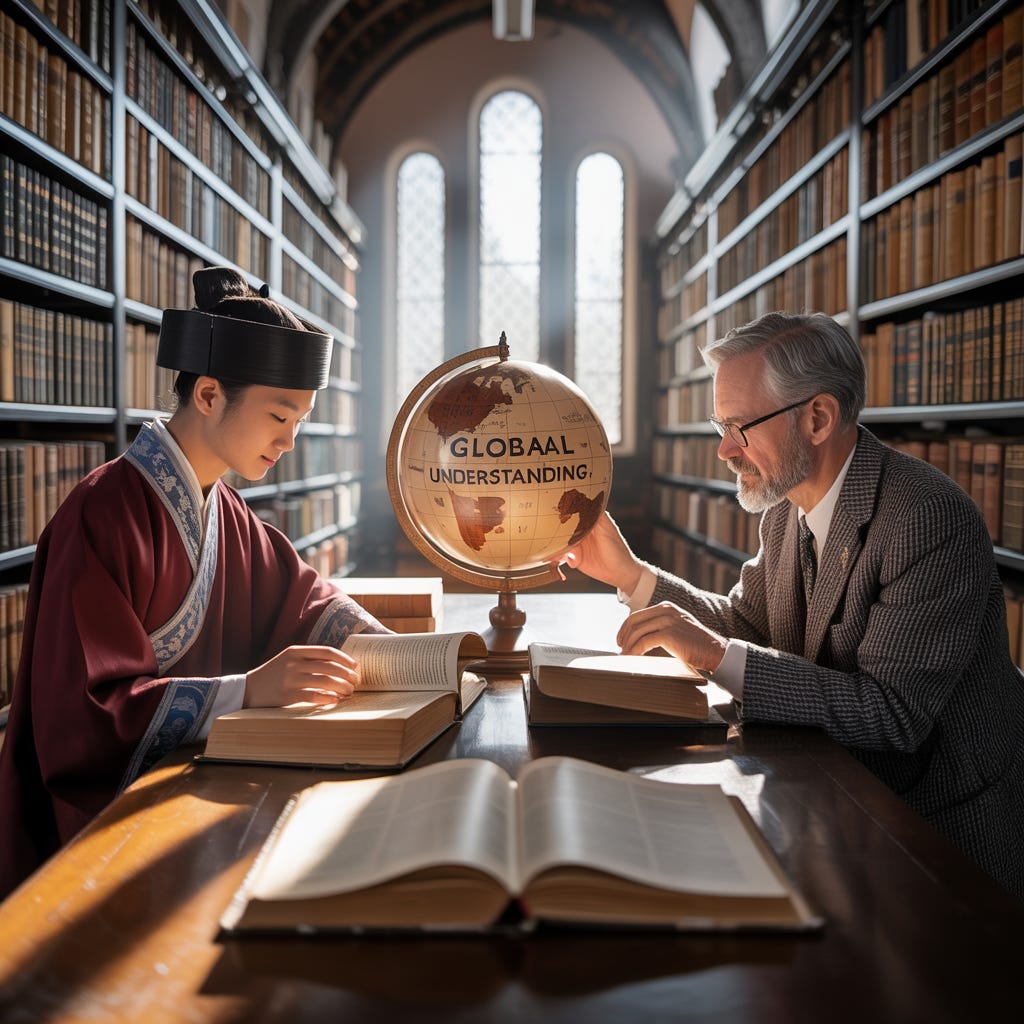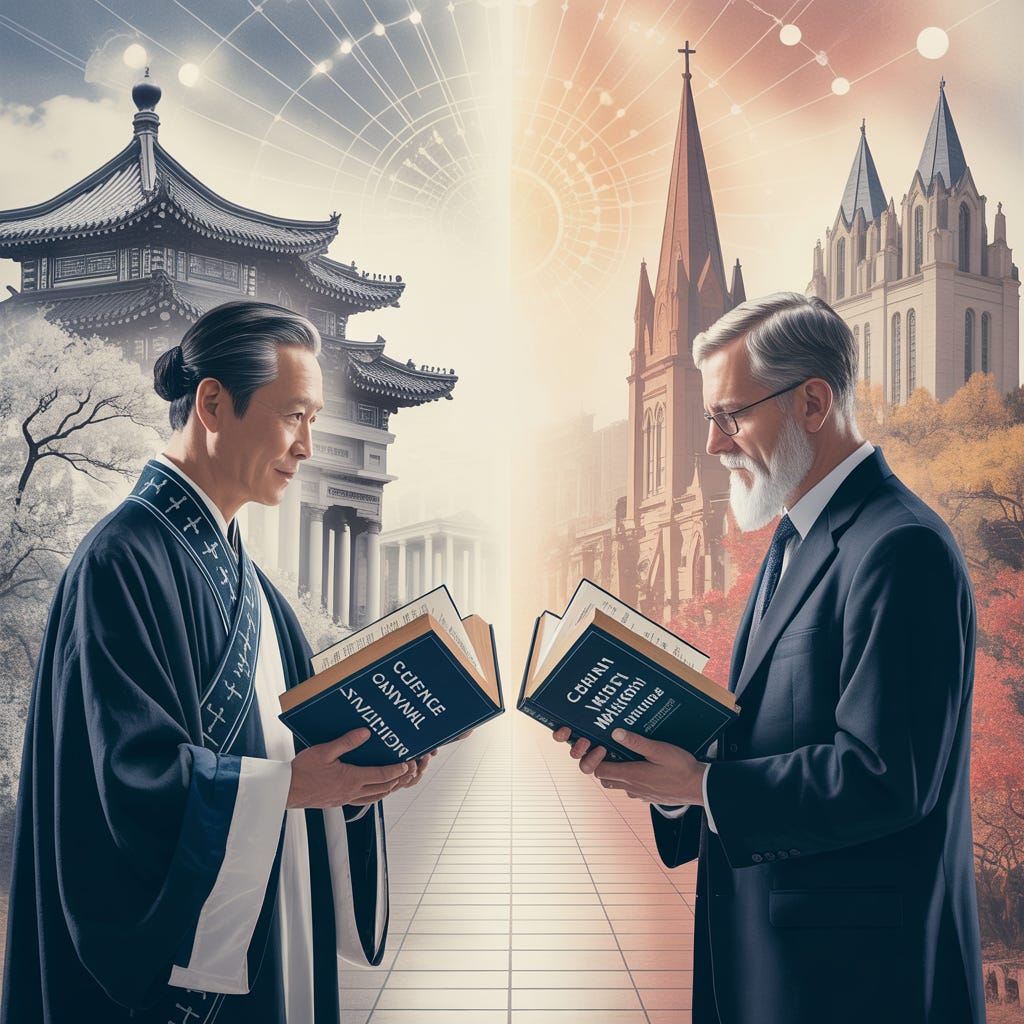The Enduring Wisdom of East and West
Lessons from Science and Civilization in China and the Christian Worldview
“For God is not a God of confusion but of peace. As in all the churches of the saints (1 Corinthians 14:33).”
Grasping the differences between the West and East through the lens of the USA versus China has become increasingly helpful and important. Joseph Needham’s (1900-1995) Science and Civilisation in China (1954) unveils a profound narrative: the intricate tapestry of Chinese science and religion, woven from threads of pragmatism, harmony, and state control, stands in stark contrast to the West’s analytical, theistic, and individualistic pursuit of knowledge.1 Needham was a British biochemist and sinologist. He was known for his left-leaning political views and sympathies towards communism, but came to some profound conclusions about the lack of an empirical scientific method within Chinese history.
As we grapple with modern debates over science, faith, and cultural identity, Needham’s insights resonate powerfully, though penned decades ago, offering a way to evaluate the strengths and shortcomings of various worldviews. Yet, as I argue in The Constantine Doctrine: Christian Leadership in Western Civilization, it is the Christian worldview, with its unique blend of divine purpose and rational inquiry, that provides the most robust foundation for navigating today’s challenges and securing a flourishing future.
The Eastern Tapestry: Harmony and Pragmatism
Needham’s work reveals a Chinese scientific tradition rooted in an organic, interconnected cosmology. From the Shang Dynasty’s astronomical records to the invention of gunpowder, Chinese science was practical, driven by agricultural and bureaucratic needs. This immediacy can also be reflected in a lack of innovation. Taoism’s emphasis on yin-yang and qi fostered a holistic view, where nature and humanity were inseparable. Religion, too, was fluid—animism, ancestor worship, and later Buddhism blended seamlessly, reinforcing social harmony under the emperor’s Mandate of Heaven.
Yet, Needham notes a critical absence: China lacked a formal scientific method akin to the West’s. The bureaucratic state, while fostering technologies like printing, stifled speculative inquiry. This pragmatism, while effective for centuries, couldn’t match the West’s theoretical breakthroughs. In 2025, we see echoes of this in debates over China’s manufacturing dominance—think of AI programs or 5G infrastructure that are built on American technology. These reflect the same practical genius Needham described, but critics argue they lack the ethical grounding or innovative spark of Western science. Chinese industrial growth is often tied to state-driven goals rather than universal truth-seeking.
The Western Crucible: Reason and Revelation
In contrast, Western science, as Needham observes, sprang from Greco-Roman logic and Christian theology. Even though his ideology was not Christian because he wrote in the 1950s, he acknowledged the basis of Western Civilization. The belief in a rational, ordered universe created by a purposeful God fueled the Scientific Revolution. Figures like Galileo and Newton saw their work as uncovering divine laws, a pursuit enabled by Europe’s fragmented political landscape and independent universities. However, this theistic framework also sparked tensions, as seen in Galileo’s clash with the Catholic Church, a dynamic absent in China’s syncretic religious landscape.
Today, these tensions persist in debates over science and faith.
From climate change to bioethics, Western societies grapple with balancing empirical rigor and political agendas with moral frameworks. Disinformation and distrust in our institutions stem from the misuse of scientific positions to promote naturalism and materialism. For instance, the 2024 U.S. election cycle saw heated discussions on stem cell research and AI ethics, with Christian voices advocating for life-affirming principles against secular utilitarianism. These reflect a Biblical view, “So God created man in his own image, in the image of God he created him; male and female he created them (Genesis 1:27).” We value human life because God gave us an eternal soul. Needham’s analysis suggests the West’s strength lies in its ability to challenge orthodoxy through reason, a legacy of its Christian roots, which posits truth as both discoverable and divinely ordained.
Modern Parallels and Cultural Crossroads
Needham’s question: why did modern science arise in the West and not in China?—remains relevant. In 2025, global challenges like AI governance, climate policy, and cultural polarization highlight the East-West divide. China’s state-driven tech advancements, like its social credit system, reflect the bureaucratic control Needham noted, prioritizing stability over individual liberty. Meanwhile, Western debates over free speech and cancel culture echo the individualism and skepticism that fueled its scientific revolutions.
Consider the 2023–2025 global AI summits, where Western nations pushed for ethical AI frameworks, often grounded in Judeo-Christian values like human dignity. China opted out. In contrast, Eastern approaches emphasized efficiency and collective benefit. These ideas mask a militaristic intent. Needham’s work suggests the West’s edge lies in its ability to integrate moral reasoning with scientific inquiry, a synthesis China’s organic worldview struggles to replicate. Instead, using a functional approach may unleash a destructive AI on the rest of the world. Yet, the West risks losing this advantage as secularism erodes its Christian foundations, leaving it vulnerable to moral relativism.
The Christian Worldview: A Beacon for the Future
Needham’s comparative study underscores a profound truth: civilizations thrive when their pursuit of knowledge aligns with a transcendent moral order. The Christian worldview, as I argue in The Constantine Doctrine, offers precisely this. It marries reason with revelation, viewing the universe as a rational creation imbued with purpose. This perspective not only birthed modern science but continues to guide ethical progress. In an era of AI, genetic engineering, and cultural fragmentation, the Christian framework provides a moral compass that neither Eastern pragmatism nor Western secularism can match.
China’s holistic approach, while admirable for its emphasis on aspects of formal harmony, lacks the disruptive inquiry needed for paradigm-shifting innovation. Secular Western ideologies, meanwhile, risk descending into nihilism without a grounding in absolute truth. This is why conservatism has historically been linked with Christianity: to provide guide rails.
Christianity, with its belief in a purposeful cosmos and human dignity, bridges this gap. It encourages bold exploration—think of Newton’s laws or Pascal’s calculator—while anchoring progress in ethical boundaries. As we face 21st-century challenges, from technological overreach to cultural erosion, the Christian worldview stands as a beacon, offering clarity, purpose, and hope. ”But seek first the kingdom of God and his righteousness, and all these things will be added to you (Matthew 6:33).”
Science and Civilisation in China Volume 1 | Cambridge University Press & Assessment. (2024). Cambridge University Press & Assessment.





